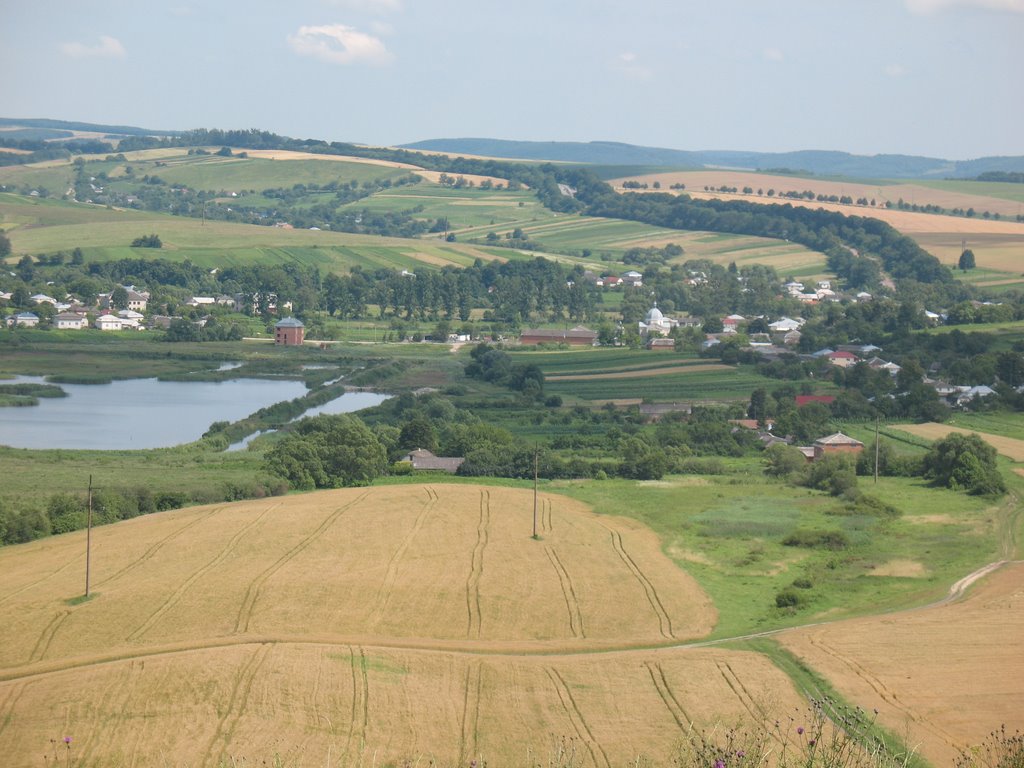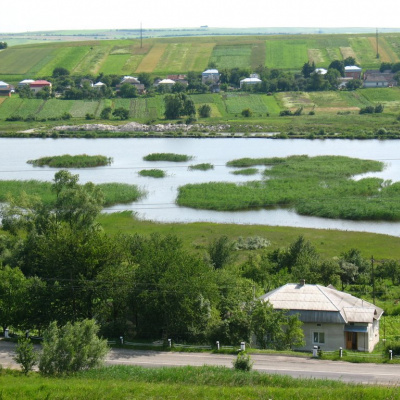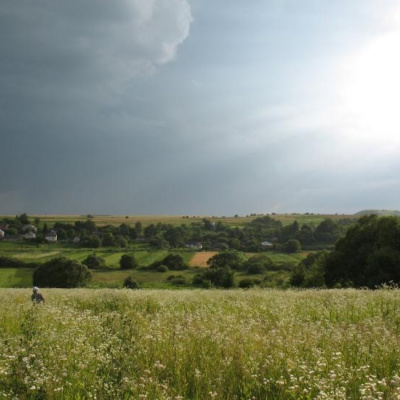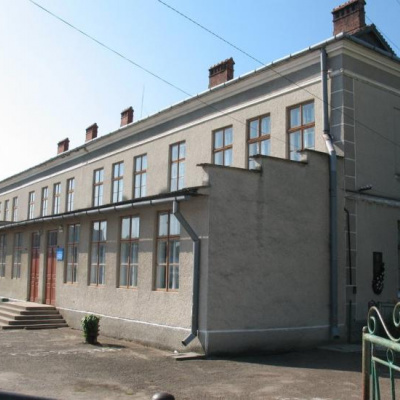Pukes.
Pukiv is a village in the Rohatyn district of Ivano-Frankivsk region. The Stryi - Ternopil highway passes through the central part of the village, and the Khodoriv - Ternopil railroad track with a stop in the village is 2 kilometers away.It is7 km from Rohatyn on its eastern side. The population is 1052 people (2001). Pukiv is conditionally divided into 6 parts: Perelisky, Kintsi, Tsentr, Zatserkva, Pidkuzia and Sloboda. The river Zymnyi (Stedenyi) Potik, which flows through the village, originates from the forests on the northern side of Perelisky and flows into Hnyla Lypa. The name of the river comes from the fact that the water in it is very cold and does not heat up even on hot days. The first mention of the village in written sources dates back to February 10, 1438. Mykola Parava gave a part of the village to the nobleman Mykola from Dzerzhaniv (Nur land) of the Hrymala coat of arms, who later acquired other parts of the estate in the village as a pledge and began to sign himself "from Pukiv" or "Pukovskyi".
The tax register of 1515 documents a mill and 4 fields (about 100 hectares) of cultivated land in the village. The village has long been populated. In pre-war times, many of its inhabitants left for Canada to seek a better life. During the First World War, 180 men were mobilized into the Austrian army, and 70 pairs of horses were confiscated from the villagers.
The Galician Zemstvo judge Mykola, a member of the Khotymirski (Khotsimirski) family of his own coat of arms, was the son of a Galician Zemstvo clerk, and held the village (also Dubovets), in particular, in 1554. Gabriel Silitskyi received the village as his grandfather's property. On October 1, 1931, a large part of the village's land was transferred to neighboring Dobryniv by order of the Minister of the Interior. In 1939, the village was home to 1990 inhabitants (1960 Ukrainians, 20 Poles, 5 Latins, and 5 Jews). In 1945-1946, the headquarters of the UPA Commander-in-Chief Roman Shukhevych was located on the outskirts of the village (Perelisky village).
The village still has a plebeian house, built, according to old-timers, 200 years ago; it was repaired in 1886. This is recorded in an inscription on the pediment of the gable porch on the main façade. To the west of the village is the botanical natural monument "Chortova Hora" and to the north is the Zhurytyn forest reserve, both of which are protected by the state and are home to rare plants not only in Europe but also in the world.

The village of Pukiv dates back to the Eneolithic period. Remains of the Late Stone Age have been found on its territory, but the first written mention of it dates back to the beginning of the fifteenth century. There are several legends about the origin of the village's name. One of them says that it comes from the name of a tree, because a beech forest has long been growing near the village. Thus, the village was originally called Bukiv, and later the letter "B" turned into "P" and began to sound like Pukiv. Another legend says that the first name of the village was Putiv, from the word path, because a road passed through the village, which in ancient times connected the town of Stratyn with ancient Halych. Later, the sound "T" was changed to "K" for a lighter sound, and the name became Pukiv.
Researcher O. Kupchynskyi believes that the name of the village of Pukiv comes from the proper name "Puka". Such names were common before the emergence of the Galician principality, as well as during its state existence. And that Puk could have been a princely vigilante or boyar. There are other versions of the origin of the village's name, they relate to pagan times, and in the future historians and local historians have much to work on to establish the true origin of the name of the village of Pukiv.
Today, the village has a village council, Pukiv secondary school of I-III grades, a pre-school "Kalynonka", a paramedic and obstetric station, a club, a village library, four shops, a lime production facility, a farm of Theodore Matusiak, and the Pukiv Cooperative Trade Association.
The village has a functioning church of the Introduction of the Blessed Virgin Mary, a Greek Catholic denomination. The church holiday is celebrated on June 25 - Onufriy the Great and December 4 - the Entry of the Blessed Virgin Mary.
A century ago, it was a wealthy village, but now the situation is different and the population has decreased by a third. Pukiv is famous for its wedding loaves, or "dolyas," embroidery, the only children's brass band in the area, and a nature reserve. But it attracts few tourists.
The people of Puky take the name of their village in stride. Although, they say, it was originally called Bukiv, because there were beech forests around. And during the Austrian Empire, foreign officials replaced the hard "b" with the usual soft "p" - that's how Pukiv appeared.
Once upon a time, fashion in Opillia came from Church and Pukov. In Cherch, there was a mineral mine run by Levko Lepkyi, the brother of a famous writer. And Pukiv was famous for its festivals, which attracted people from the surrounding villages. They showed folk costumes, competed in singing and physical exercises. A rich village could afford to host guests. This wealth also gave the village its independence, for which the inhabitants were once called "Puky radicals."
There are not many tourists who would be interested in the same Chortova Hora or the history of the village, where in the winter of 1945-1946 there was a safe house and a hiding place for the chief commander of the UPA Roman Shukhevych. The village of Pukiv is also interesting for its traditions. There have long been famous embroiderers here. And their pride did not allow them to copy each other's patterns. People from the city, different villages, and even neighboring districts come here to order wedding "doli" - special loaves of bread that are considered a kind of talisman for the newlyweds and are given to all wedding guests after the marriage. They are baked only by those women who are happy in marriage, have a good husband who is not a drunkard, and have polite children. And when they are going to bake the loaf, each housewife "contributes to the 'fate'" by bringing flour, sugar, or honey from home. The rite of baking a wedding loaf is recreated by a folklore amateur group from Pukov.
Рекомендуємо відвідати в Pukes.



